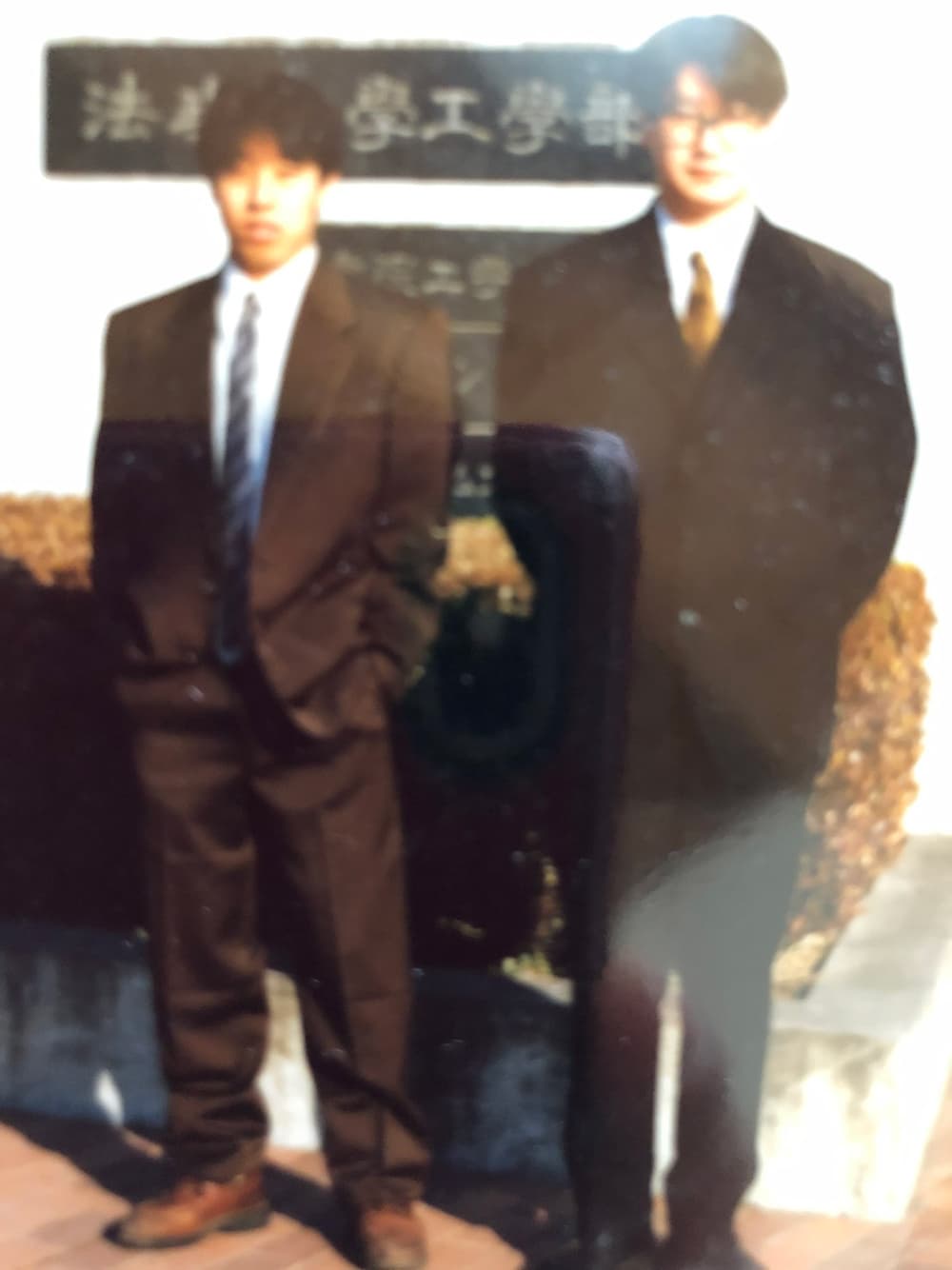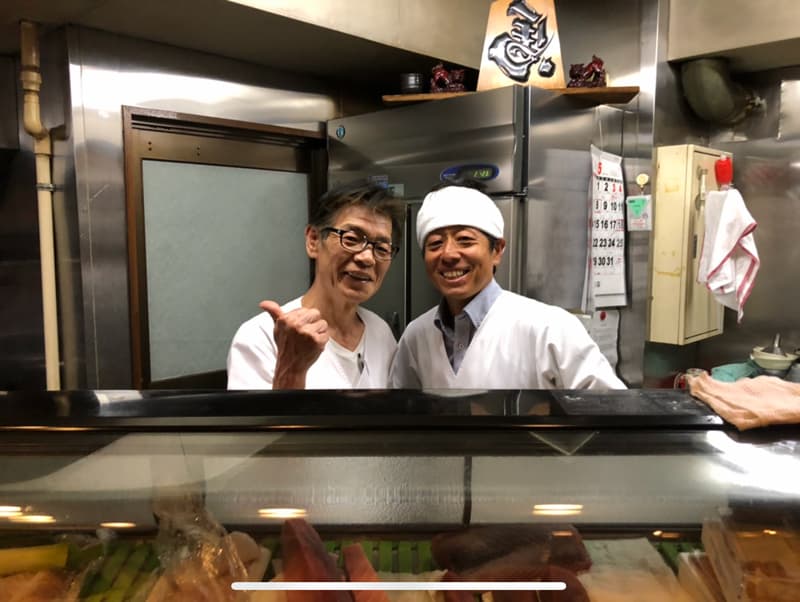Chapter 02
Earn your own living. The reason for choosing to start a business
When did Yamamoto, who started his company at the age of 31, become interested in starting a business? In the previous chapter, we talked about the company that Yamamoto started, but in this chapter, we will touch upon Yamamoto's unique values while asking about episodes from his 20s and how he came to start his own company.
When I was a university student, I wanted to gain work experience
Mr. Yamamoto, who spent his high school years in his hometown of Hamamatsu, Shizuoka Prefecture, moved to Tokyo for college and entered the Department of Mechanical Engineering at Hosei University. When I asked him, "What did you want to do and why did you choose your university and department?" he replied,
Yamamoto's life in middle and high school was centered around club activities and studying for entrance exams, so in college he wanted to try something he had never experienced before. During his time at university, he studied academically to a certain extent, but also enjoyed a normal student life with part-time jobs, club activities, playing mahjong with friends, and romance. When it came to club activities, he belonged to a total of three organizations (the boxing club, the tea ceremony study group, and the tennis club). That's an unusual combination (lol).

Yamamoto-san, 20 years old. He couldn't go home on Coming of Age Day because he had university exams, so he was with a friend in front of the university.

With the master of the Japanese restaurant "Isoya" at a company drinking party in 2019. Yamamoto-san was dressed as a Japanese restaurant employee from his time as a university student.
Interested in driving, Yamamoto applied for a job as a delivery driver as soon as he got his driver's license. The 2-ton refrigerated truck was not suitable for beginners, and he damaged it several times, but each time a senior employee would secretly fix it by hand. He also had a variety of experiences, such as working in a fast food restaurant, a Japanese-style coffee shop, a day laborer for moving, a salesgirl in a department store basement, and an izakaya kitchen, and observed the two sides of society through the adults working there. This period also overlapped with the bubble era, and while working part-time at a Japanese restaurant, he felt the frenzy of adults at the company's entertainment banquets. The reason he chose a Japanese restaurant was because "I thought they would serve delicious staff meals," and he still visits Kichijoji's "Isoya" to this day, saying that he will never forget the kindness of the food he received.
An encounter with a book that made me realize my independence
When I talk to Yamamoto, the phrase "earn your own living" comes up often. Even if he doesn't say it directly, I sense a strong sense of independence in his conversations and actions, so I got the impression that Yamamoto is "a person who is like the epitome of independence." When I asked him, "Have you always had a strong sense of independence?" he said that a big turning point was a book he came across when he was a sophomore in college called "A Message to the Wolves."
This book is a philosophy of life written by journalist and author Nobuhiko Ochiai for young people, and it is full of ideas rooted in independence, such as "Don't rely on others," and "Go and get what you want with your own efforts, that is the joy of living." After that, Yamamoto ended up reading almost all of Ochiai's books, and in the process, he became clearly aware of his own desire to "live independently and freely."
2016.05 Independence and autonomy
To start his career as a programmer, Yamamoto chose to work at a software venture in his hometown of Hamamatsu. The company was founded by a small group of people who had graduated from Tokyo University and Kyoto University and worked as engineers at major companies, and was in its seventh year of growth. It was a notable company with an acceptance rate of less than 1% even in this day and age.
Yamamoto had a strong impression of being a group of highly skilled specialists, and he really wanted to work there. At the final interview, he passionately told the executives, "I don't need a salary. I'll train and get a salary when I'm able to do the job. I want to be independent in the future. Please hire me!" His
enthusiasm must have been conveyed, as he was successfully hired and was able to start his first steps as a working adult at the company. It's amazing to be able to say "I don't need a salary, so please hire me!", but it takes courage to honestly say "I want to be independent in the future" at the interview stage, and I thought it was a line that would be difficult to say unless you have confidence in yourself.
After getting a job at the company he wanted, Yamamoto spent his days dedicated to gaining experience as an engineer. He said that he often had to work late into the night, but he was engrossed in the excitement of being able to do things he hadn't been able to do before. He says he only has happy memories and no memories of hardship. Meanwhile, as he saw his highly skilled seniors struggling to make it on their own, he thought, "If it's difficult even for such talented people, it must be difficult for me to make a living if I go out on my own..." He also felt in his daily work that "I'm not good enough to become a specialist engineer." After working for just under three years after joining the company as a new graduate, he gave up on the idea of going on his own in this field.
Once you make a decision, give it a go without hesitation or hesitation. That was the slogan that came from his experience at that time.
What I gained from not having a career
His next goal was to become independent in the field of sports. He changed jobs to a tennis club to compete in tennis, which he was good at. People around him were surprised at his unusual and bold choice, but Yamamoto himself, who does not look back on the past, did not think that this choice was a waste as it could have wasted his academic and work history. Rather, he only saw the future and thought, "I'm going to go with this!" However, after a year and a half of being a tennis coach, Yamamoto realized that the job of teaching people itself did not suit his aptitude.
So he decided to become independent with a national qualification, took the social insurance labor consultant exam and passed, and learned practical skills while working at a private office in order to obtain the qualification to open a business. He gained two years of experience as a social insurance labor consultant, but he could not imagine himself continuing his life in a job that was full of repetitive tasks and had no creativity, so he once again gave up his career.
"Most people in their 20s probably don't know what they want to do or what they can do. Rather than thinking and worrying, I think that by taking action and failing, you can see who you are. Of course, I'm sure I was always thinking seriously about my future, but in the end, I'm doing something different now. If there's anything I've learned, it might be that in my 20s I was able to eliminate one by one the things I wasn't suited to or interested in." (Yamamoto)
Ultimately, the programming skills I gained at my first company became an asset and was put to good use when I started my own business in the Internet industry.
"I think the skills remained because I learned them seriously and with all my might over a period of just under three years. I don't think I was thinking about coming back to this world when I left, but my programming skills came back right away, even though I had a seven-year hiatus. I'm grateful to the company that gave me the environment to learn and to my seniors who taught me the job." (Yamamoto)
I think that the fact that he was not suited to teaching, his knowledge of labor as a social insurance labor consultant, and his bitter experiences as a candidate for president are all worthwhile experiences to become a manager, and I think that the career he did not pursue is proof that he faced himself honestly and got back on track. Also, the fact that he was able to let go of the career he had once grasped without hesitation is proof that he always trusted himself to take on new challenges.
The reason I chose to start a business was because of my desire for independence and experience
At the root of Yamamoto-san's life was a strong desire for independence, "I want to live a life where I can earn my own living." At the same time, a desire for experience greatly influenced Yamamoto-san's guidelines for action. He had always had a stronger desire than most to "experience as many things as possible in this one and only life." Looking back at his time as a university student, he belonged to completely different clubs.
For Yamamoto-san, the choice to start a business was not only a way to earn his own living, but also a way to stimulate his desire for experiences, by experiencing things he had never experienced before. Generally, people who start a business are motivated by outward things such as making a lot of money, becoming famous and leaving their mark on history, or making an impact on society. However, in Yamamoto-san's case, it was none of these, and I felt that it was an "inward motivation" to talk to himself and face himself.
NEXT